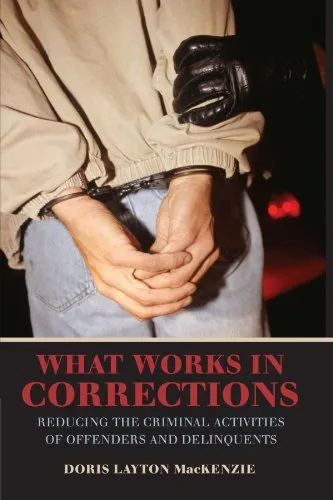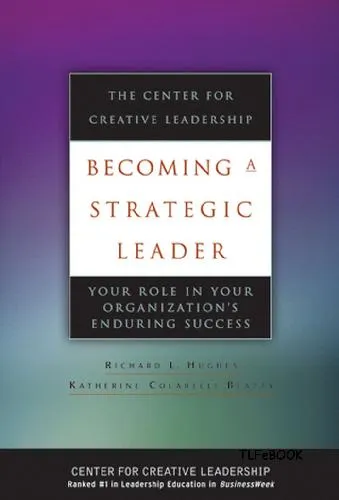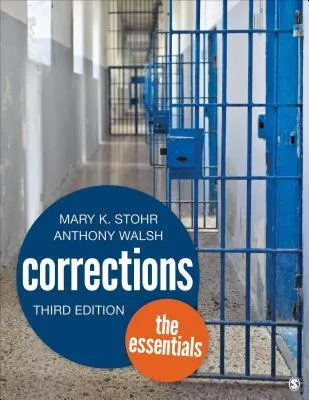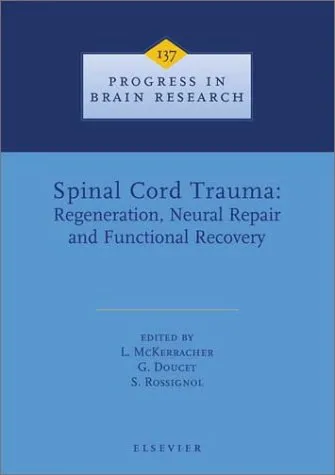What Works in Corrections: Reducing the Criminal Activities of Offenders and Delinquents
4.5
بر اساس نظر کاربران

شما میتونید سوالاتتون در باره کتاب رو از هوش مصنوعیش بعد از ورود بپرسید
هر دانلود یا پرسش از هوش مصنوعی 2 امتیاز لازم دارد، برای بدست آوردن امتیاز رایگان، به صفحه ی راهنمای امتیازات سر بزنید و یک سری کار ارزشمند انجام بدینکتاب های مرتبط:
معرفی کتاب 'What Works in Corrections: Reducing the Criminal Activities of Offenders and Delinquents'
کتاب 'What Works in Corrections: Reducing the Criminal Activities of Offenders and Delinquents' اثر Doris Layton MacKenzie یکی از منابع مهم و مفید در زمینه کاهش رفتارهای مجرمانه و اصلاح و بازپروری خلافکاران و جوانان بزهکار است. این کتاب به تحلیل و بررسی روشها و مداخلات مؤثر در اصلاح زندانیان و کاهش میزان جرم میپردازد.
خلاصه کتاب
کتاب مذکور به بررسی علمی و جامع برنامههای Corrections پرداخته و در تلاش است تا اثربخشی این برنامهها در تغییر رفتارهای خلافکارانه و کاهش نرخ بازگشت به جرم را ارزیابی کند. مککنزی در این کتاب از مدلهای نظری Correctional Theory استفاده کرده و شواهد تجربی را ارائه میدهد تا نشان دهد چه رویکردهایی در کاهش رفتارهای Criminal و تقویت جوانب مثبت شخصیت Offenders کارآمد است. او به تحلیل دادههای آماری از برنامههای مختلف میپردازد و پیشنهاداتی برای بهبود نظامها و روشهای فعلی ارائه میدهد.
نکات کلیدی
- تحلیل علمی و جامع از روشهای کاهش جرم و بازپروری.
- ارزیابی اثربخشی برنامههای موجود و پیشنهاد تغییرات برای بهبود آنها.
- پرداختن به نقش Corrections در جامعه و امنیت عمومی.
نقلقولهای معروف از کتاب
"برنامههایی که توسعه مهارتهای اجتماعی، آموزشی و حرفهای Offenders را هدف قرار میدهند، بیش از آنهایی که صرفاً بر مجازات تمرکز دارند، موثرتر هستند."
"کاهش نرخ بازگشت به جرم نیازمند برنامهریزی دقیق و اجرای دقیق برنامههایی است که بر اساس شواهد کارآمد طراحی شدهاند."
اهمیت این کتاب
اهمیت کتاب 'What Works in Corrections' در واقعیتگرایی و دیدگاه علمی آن است. مککنزی با ارائه شواهدی که موجب درک بهتر از تأثیرات اصلاح Corrections بر Offenders میشوند، نقش کلیدی در پیشبرد دانش این حوزه داشته است. این کتاب نه تنها برای سیاستگذاران و مسئولین قضایی اهمیت دارد، بلکه بایستهٔ مطالعه محققان، دانشجویان و هر فردی است که به دنبال درک بهتر مسیر درست اصلاح رفتارهای مجرمانه میباشد.
Introduction
Welcome to the comprehensive introduction to the book "What Works in Corrections: Reducing the Criminal Activities of Offenders and Delinquents," authored by criminologist Doris Layton MacKenzie. This book serves as an essential resource for those looking into evidence-based methods for reducing recidivism among offenders and delinquents. Addressing policymakers, practitioners, and researchers alike, this book offers critical insights into the efficacy of correctional programs.
Detailed Summary of the Book
The premise of "What Works in Corrections" arises from the critical question: What interventions effectively reduce the criminal activities of offenders and delinquents? Over the decades, policymakers and correctional agencies have faced challenges in identifying and implementing programs that genuinely work. This book provides a systematic review and meta-analysis of correctional interventions, meticulously evaluating various programs that range from cognitive-behavioral therapy to educational and vocational training.
MacKenzie dives deep into each type of intervention, using empirical data to analyze their success rates in reducing recidivism. By differentiating the effective programs from the ineffective ones, this book equips readers with the knowledge needed to develop, support, and advocate for successful correctional initiatives. Additionally, MacKenzie discusses the limitations of conventional approaches and highlights the necessity for innovative strategies in the ever-evolving field of corrections.
Key Takeaways
- Evidence-based programs are essential for reducing recidivism.
- Cognitive-behavioral therapies stand out as one of the most effective interventions.
- The treatment must be tailored to the individual needs of offenders and delinquents.
- Interventions must be implemented with fidelity to achieve desired outcomes.
- Programs that blend education, vocational training, and therapy show promising results.
Famous Quotes from the Book
"To reduce crime effectively, we must move beyond traditional punitive approaches and embrace interventions that are supported by scientific evidence."
"The future of correctional systems relies on our ability to innovate and adapt, learning from evidence rather than sticking to outdated methods."
Why This Book Matters
This book is a pivotal contribution to the field of criminology and corrections. At a time when criminal justice systems worldwide are under scrutiny for their high recidivism rates and inefficient use of resources, MacKenzie's work becomes highly relevant. By advocating for the implementation of evidence-based correctional programs, "What Works in Corrections" provides a powerful argument for reforming current systems.
The book's emphasis on the use of scientific research to guide correctional practices is not just a theoretical proposition but a practical necessity. By aligning interventions with the specific risks and needs of offenders, the book outlines a clear path forward for reducing crime and improving community safety.
In addition to its practical implications, this book serves as an academic cornerstone for students and scholars in criminology and related fields. It not only synthesizes an extensive body of research but also encourages critical thinking and problem-solving, making it indispensable for anyone committed to improving the outcomes of correctional systems.
دانلود رایگان مستقیم
شما میتونید سوالاتتون در باره کتاب رو از هوش مصنوعیش بعد از ورود بپرسید
دسترسی به کتابها از طریق پلتفرمهای قانونی و کتابخانههای عمومی نه تنها از حقوق نویسندگان و ناشران حمایت میکند، بلکه به پایداری فرهنگ کتابخوانی نیز کمک میرساند. پیش از دانلود، لحظهای به بررسی این گزینهها فکر کنید.
این کتاب رو در پلتفرم های دیگه ببینید
WorldCat به شما کمک میکنه تا کتاب ها رو در کتابخانه های سراسر دنیا پیدا کنید
امتیازها، نظرات تخصصی و صحبت ها درباره کتاب را در Goodreads ببینید
کتابهای کمیاب یا دست دوم را در AbeBooks پیدا کنید و بخرید
1319
بازدید4.5
امتیاز0
نظر98%
رضایتنظرات:
4.5
بر اساس 0 نظر کاربران
Questions & Answers
Ask questions about this book or help others by answering
No questions yet. Be the first to ask!















